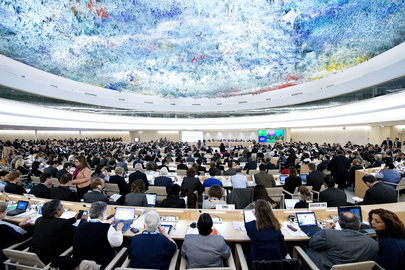
Iran: Human Rights Council must convene a special session
Fifty organisations urge the UN Human Rights Council to urgently convene a special session to address an unprecedented escalation in mass unlawful killings of protesters in Iran.

‘If we do not defend human rights defenders, we do not defend human rights’, Germany pronounced during the high-level segment with which the Human Rights Council’s 25th session opened. The statement set the tone for a session in which the role of human rights defenders, the risks they face and the need to protect them, has been forefront.
(Geneva) – ‘If we do not defend human rights defenders, we do not defend human rights’, Germany pronounced during the high-level segment with which the Human Rights Council’s 25th session opened. The statement set the tone for a session in which the role of human rights defenders, the risks they face and the need to protect them, has been forefront.
During a debate on countries with serious human rights violations, it became clear that the reality on the ground is far from secure for human rights defenders, and that, in the words of the Special Rapporteur on human rights defenders, ‘defending human rights remains a dangerous activity’.
The Special Rapporteur on the human rights situation in Iran noted that hundreds of individuals reportedly remained in some form of confinement for exercising their fundamental rights, including journalists, bloggers, and human rights defenders.
States such as Norway, Germany, and the US also expressed concerns over the ‘deteriorating’ situation of human rights defenders in a number of States. Protesters on the streets of Venezuela and Egypt risk arbitrary arrests and violence; those who peacefully challenge State authority in China are illegally detained; as are those supporting the political opposition in Belarus. For example, Ales Bialiatski remains in detention in Belarus where he has been held on tax evasion charges since 2011. Germany called for the immediate release of all political prisoners in the country and deplored the on-going harassment of civil society, political opponents and the media.
Several NGOs drew attention to the detention of two human rights defenders in Sri Lanka. Ruki Fernando and Father Praveen were subsequently released. Sri Lanka responded to the outrage by claiming that the defenders had been held in connection with an investigation into attempts to revive the Liberation Tigers of Tamil Eelam (LTTE).
In Myanmar, said the Special Rapporteur on the situation in the country, there was increasing freedom for the media, but current bills under consideration risk placing new restrictions on these evolving freedoms. Elsewhere restrictions on freedom of speech pose limitations to the work of the media and journalists. In the Crimea region of Ukraine, journalists have been detained and independent media blocked, said Germany, while in Sri Lanka the working conditions of journalists continue to deteriorate.
Internet censorship in Iran was a serious concern for many States, including Australia and EU member States. The US criticised the shutdown of the media and the internet in Venezuela, and the increased control over the media and the internet in China. In return China drew attention to the ‘large-scale eavesdropping programme’ that it described the US and its allies of engaging it. China felt that this was an example of the broader ‘double-standards’ displayed throughout the debate, and expressed incredulity that some countries were so keen to ‘name and shame’ others and thereby ‘damage the basis for cooperation’.
Several States expressed concern at draconian laws passed against homosexuality in, for example, Russia, Uganda, and Nigeria. These laws violate international human rights standards and as Norway, Ireland and Austria pointed out, will endanger the lives of innocent people, fuel hatred, and encourage violence. Norway observed that the legislation threatens all human rights defenders promoting universal human rights, while Ireland pointed to the impact the legislation will have on efforts to prevent the spread of HIV/AIDS.
The EU pointed out that such laws are part of wider crackdowns on civil society and minorities, noting that in Russia, in addition to the intimidation of the LGBTI community, legislation has been passed to restrict freedom of expression and freedom of assembly and association and that the work of human rights defenders is being impeded. It gave as examples the recent sentencing of eight peaceful protestors who participated in the Bolotnaya Square demonstration in May 2012, and the sentencing of environmental activist Evgeny Vitishko.
Shock and sadness was expressed by States, including EU member States and the US, at the tragic death of Chinese human rights defender Cao Shunli during detention in China. The case highlights the very real existence of reprisals against human rights defenders seeking to work with the UN mechanisms.
There were strong responses from Russia and Venezuela, amongst others, to the criticisms received. Appeals were made to national sovereignty, and the principle of non-interference in domestic affairs. Venezuela, supported by Nicaragua and others, claimed that the unrest in its country is due to international intervention. Russia, on the other hand, claimed that the situation in the Crimea legitimately concerns Kiev and Moscow, but not the international community.
States are currently negotiating a resolution on peaceful protests. Against a global background of widespread human rights violations committed against protesters, the resolution represents an opportunity for the Human Rights Council to recognise the contribution that protests make to democracy and human rights, and to strengthen their commitment to protecting protesters against violations.

Fifty organisations urge the UN Human Rights Council to urgently convene a special session to address an unprecedented escalation in mass unlawful killings of protesters in Iran.

The Escazú Ahora Chile Foundation, the Protege los Molles Foundation and ISHR demand that the investigation, arrest and legal proceedings involving Julia Chuñil's relatives be conducted in accordance with international standards of due process.

In a landmark ruling against Burundi, the UN Committee against Torture has set a precedent on the protection of lawyers and human rights defenders engaging with UN mechanisms, affirming that reprisals for cooperating with the UN violate the Convention Against Torture.